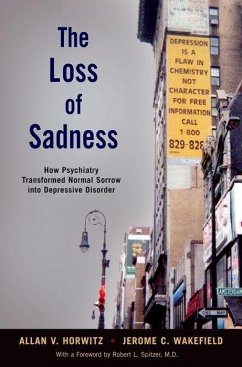The result is a pointed yet nuanced critique of modern psychiatry that will stir controversy of the sort that will reacquaint us with sadness as a primary human emotion and that could productively influence the way that depression the actual illness is characterised in the future.
The Loss of Sadness argues that the increased prevalence of major depressive disorder is due not to a genuine rise in mental disease, but to the way that normal human sadness has been 'pathologised' since 1980. That year saw the publication of the landmark third edition of The Diagnostic and Statistical Manual of Mental Disorders (DSM-III), which has since become a dominant force behind our current understanding of mental illness. The result of this is in the years since the DSM-III's appearance, virtually all research and clinical approaches to depression have been based on an flawed definition of the condition, resulting in far-reaching scientfic, social, and political implications that affect us all.
Hinweis: Dieser Artikel kann nur an eine deutsche Lieferadresse ausgeliefert werden.
The Loss of Sadness argues that the increased prevalence of major depressive disorder is due not to a genuine rise in mental disease, but to the way that normal human sadness has been 'pathologised' since 1980. That year saw the publication of the landmark third edition of The Diagnostic and Statistical Manual of Mental Disorders (DSM-III), which has since become a dominant force behind our current understanding of mental illness. The result of this is in the years since the DSM-III's appearance, virtually all research and clinical approaches to depression have been based on an flawed definition of the condition, resulting in far-reaching scientfic, social, and political implications that affect us all.
Hinweis: Dieser Artikel kann nur an eine deutsche Lieferadresse ausgeliefert werden.








